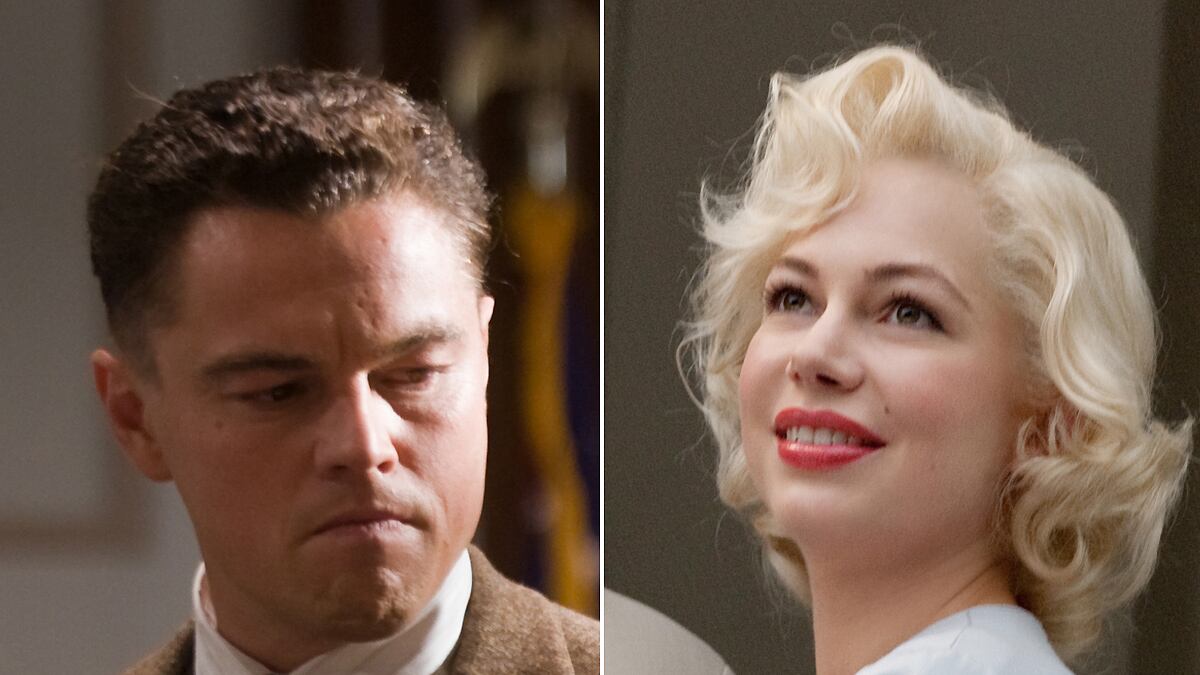It is turning out to be a very odd year for the nation’s two great contests: the election of our president and the campaign to name the Best Picture at next year’s Academy Awards ceremony. And as it turns out, the two races are looking pretty similar. In the Republican presidential competition, all year long a series of candidates have swirled around, none of them quite able to close the deal. In the Oscar battle, meanwhile, a cluster of films (primarily The Artist, The Descendants, and War Horse), none of which looks to be anyone’s ideal of a Best Picture winner, hope to be the last man standing on Feb. 26 when, ultimately, the trophy must go to one of them.
As weird as the Best Picture race is, the campaign in the lead acting categories is even stranger: a good half of the leading contenders in the Best Actor/Best Actress categories are in movies largely considered so-so at best, if not downright awful. Despite the acclaimed performances at their centers, at least three of these films (The Iron Lady starring Meryl Streep as Margaret Thatcher, J. Edgar with Leonardo DiCaprio, and My Week With Marilyn with Michelle Williams) are given almost no chance of scoring Best Picture nominations, let alone winning.
The phenomenon of acclaimed performances in mediocre films is becoming something of an Oscar staple these days. In Hollywood’s golden age, the celebrated films of the day were often giant star vehicles, dramas and tearjerkers that let the leading men and women emote until the rafters fell down. But as big-budget prestige dramas have all but disappeared, grown-up actors are forced to look farther afield for showcases. In these obscure corners they have found the chance to show what they’ve got, but, sadly, not necessarily in vehicles operating on their level of talent.
This dichotomy points out the degree to which the Academy has embraced other cinematic skills beyond scenery chewing. The trend in Best Picture winners of recent years has been director-driven projects such as Slumdog Millionaire, The Hurt Locker, and No Country for Old Men, rather than star vehicles. With Oscar feeling more like a cinema literate society lately than it did in days of yore, that has not been a great thing for the traditional actors’ showcases.
However, the flip side of that point raises an interesting question: how great can these performances be if the film is still bad?

My Week With Marilyn provides a good case in point. The film is an amiable but formless waft through a 1950s British film set. It is a good-natured, but not particularly well-thought-out, period piece—heavy on the art design, light on the plot construction—that generally typifies an HBO movie these days. The film flops and bounces around, and at the center of it sits Michelle Williams dressed up in platinum wig and beauty mark doing Marilyn Monroe. In the Best Picture category, My Week With Marilyn is on no one’s list of Oscar contenders. The performance is on everyone’s.
Critics have noted how Williams coos and whispers in convincing Marilyn fashion. She also, as many have observed in promoting her Oscar chances, captures the glimpses of the sadness beneath the champagne bubbles. But what gravitas the performance has seems utterly at odds with the otherwise frothy production, which, while showing the troubles lurking in Marilyn’s soul, seems to have no clue what they’re about or what to do with them (aside from dropping a few hints about a loveless childhood with the subtlety of a Mack truck). It is not Williams’s fault that she is stuck having to do the work on a character that the script has failed to, but still, you might leave the theater feeling you know less about the title character then when you entered.
Marilyn feeds into Oscar’s greatest soft spot—actors doing impressions of famous historical people. In the past decade, no fewer than nine of the acting prizes have gone to actors working in this genre, impersonating everyone from June Carter Cash (Reese Witherspoon) to Idi Amin (Forest Whitaker). The category gives actors the chance to do showy, attention-grabbing work, stepping into ready-made characters. But if Oscar voters ever stop fluttering about how much Williams can sing “just like Marilyn,” the comparison is not necessarily to her benefit, and it points out the problem of the good-performance/bad-film dichotomy.
The fact of the matter is Marilyn Monroe never made a bad film, because they were all films starring Marilyn Monroe. Even the worst of them—for instance, the listless Prince and the Showgirl, the shooting of which is the subject of Marilyn—is still a joy to watch half a century later, since Marilyn’s performance injects every frame with nuclear energy. The same will not be said about My Week With Marilyn, no matter how proficient Williams is.
Across the ring in the actors’ category sits Leo DiCaprio, now an Oscar veteran with three nominations under his belt, looking for his first win. His film J. Edgar sat near the top of most lists right up until the moment when pundits actually saw the film, at which point its buzz plummeted to oblivion. Nonetheless, critics emerged from the film very impressed that Leo had turned in a compelling performance as the manic FBI director. With him hyperventilating and desk-pounding his way through the movie, it is certainly the most animated performance on the prospective Best Actor roster this year (a list that includes George Clooney’s depressive turn in The Descendants and French actor Jean Dujardin’s silent one in The Artist). It is compelling and memorable, but it is, sadly for Leo, entirely at odds with director Clint Eastwood's micro-stated tone.
In retrospect, the choice of such a frenzied subject for such a minimalist style seems an unfortunate fit. Which raises the question: can a performance be great if it is completely out of sync with the rest of the film? Does the actor bear any responsibility for keeping himself in a similar key with the entire production?
Ultimately, great performances are not about acting as a self-involved exercise unto itself, but about creating great, rich, unforgettable characters. And if a film has a great, rich, unforgettable character at its heart, audiences will forgive it a galaxy of sins. But if the film is forgettable, how unforgettable can the performance be? In recent years, Oscar has bestowed its favors for various reasons—some political, some artistic—on performances in a collection of films that were almost erased from the public imagination while they were still on the screen: The Reader, La Vie en Rose, Walk the Line, Crazy Heart, and Capote, to name a few. Despite the alleged brilliance at their hearts, the films have managed to be forgotten. Perhaps that is a judgment Oscar should consider the next time it rewards good work in a failed project.






